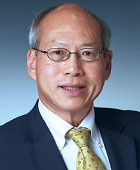Merging East and West
Abstract

Francis G. Lu, M.D., is the Luke and Grace Kim Professor in Cultural Psychiatry, Emeritus, at the University of California, Davis. He is a corresponding member of APA’s Council on Minority Mental Health and Health Disparities and chaired the council from 2003 to 2008. He is on the Executive Committee of the Caucus on Religion, Spirituality, and Psychiatry.
At APA’s Annual Meeting in Atlanta in May 2016, President Renée Binder awarded me a Special Presidential Commendation “for extraordinary leadership and outstanding contributions to the field of cultural psychiatry.” I am grateful to Psychiatric News and former APA President Anita Everett, M.D. (who created this column), for giving me the opportunity to share some of the story of my journey in becoming a cultural psychiatrist.
My parents came from Shanghai and Canton in the late 1940s as graduate students, but they decided to stay in the United States after the Chinese revolution. They married in San Francisco, where I was born in 1949. During the 1950s, I grew up in the suburbs of Baltimore and New York City in essentially white communities where I occasionally encountered racial slurs. My father and mother perceived racial discrimination in their workplaces, but it was hard for me to fully grasp these issues at the time. I matriculated to Columbia College and experienced the tumultuous campus takeover of 1968, which, along with the other events of 1968, graphically opened my eyes to the possibility of political change.
Between my sophomore and junior years at Columbia, I went to Dartmouth to take summer school courses in introductory psychology and sociology, which focused on group dynamics in a “T-group,” or training group. It was during the intense experience of learning about myself and my relationships with others in the training group that I was inspired me to enter psychiatry.
During my medical school years at Dartmouth Medical School (DMS), I had a strong mentorship relationship with Bernard J. Bergin, Ph.D., a longtime professor of psychiatry at DMS and a professor of sociology at Dartmouth College. We had extraordinary conversations on a regular basis on existentialism and the importance of imagination in one’s life. I was also fortunate to participate in an MS-2 small group course on psychiatry interviewing taught by Gary Tucker, M.D., who went on to become department chair at the University of Washington in Seattle. Furthermore, my MS-3 psychiatry clerkship was taught by Jerrold Maxmen, M.D., a charismatic and personable teacher. Finally, I took an elective in psychoanalysis in which I viewed sessions through a one-way mirror taught by Raymond Sobel, M.D. All of these experiences with teachers and mentors during medical school reinforced my decision to enter psychiatry. Sadly, they have all passed away over the years. I never forgot the importance of their teaching and mentorship, which I have carried forward in my career with medical students, residents, and junior faculty.
During my general psychiatry residency at Mount Sinai Medical School in New York City, I received psychoanalytically oriented training that was directed by Edward Joseph, M.D., a world-renowned psychoanalyst. While I am grateful for this training, cultural issues were hardly acknowledged or discussed, which was on par for the times. I kept thinking that something was missing. In my last year, I was supervised by Gerald Epstein, M.D., who opened my eyes to “waking dream work” and transpersonal psychology. After graduation, I decided to move to San Francisco to work at UCSF/San Francisco General Hospital and to explore transpersonal psychology.
In May 1977, I attended a five-day seminar at Esalen Institute in Big Sur, Calif., titled “Hinduism and Buddhism in Oriental Art” taught by the mythology scholar Joseph Campbell. It was a life-transforming event in that after the seminar, while still at Esalen in the sunlight on the deck, I experienced a very powerful physical epiphany that my purpose in life was to bring together the East and the West. I did not know what that meant at that time, but in looking back over the past 41 years, I see that my work as a cultural psychiatrist began at that point. I have also led or co-led 35 film seminars at Esalen Institute, 28 with Brother David Steindl-Rast, a Benedictine monk from Austria. Where else but in California would a Chinese-American psychiatrist born in San Francisco and a Benedictine monk born in Austria come together to co-lead film seminars! ■



